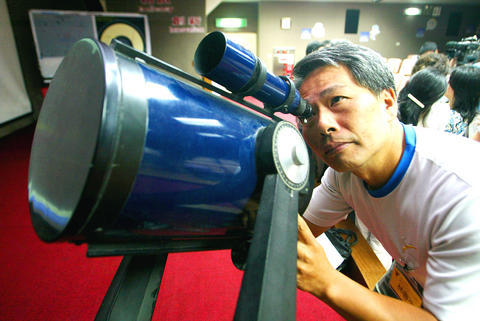It was so faint amid the star-freckled blackness that professional star-gazer Lin Chi-sheng (林啟生) missed it as he photographed the heavens from Lulin Observatory, Nantou County, earlier this month.
Luckily, Lin's camera, recording time-lapse images of space through the observatory's telescope, didn't miss it -- a mighty chunk of ice and rock "a few kilometers" in diameter and hurtling toward Earth: "Asteroid C/2007-N3."
Since named "Lulin Comet," the galactic "dirty snowball" -- as an observatory press release calls it -- won't mean much to the average terrestrial, except perhaps on Feb. 27, 2009, when the comet will likely become visible to the naked eye as it cruises within 60 million kilometers of Earth -- a "close shave" in astronomical terms.

PHOTO: CNA
For Taiwan, however, Lulin Comet and a smaller "near-earth asteroid" (NEA) captured in the same photograph are the first discoveries of their kind by local astronomers -- a rare find that puts the nation on the map in the global astronomical community.
"It seemed like just another night," Lin told a press conference yesterday, referring to his July 11 late shift at the remote, mountaintop observatory.
But Lin's camera was trained on a lucky slice of sky that evening, snapping shots of a starry patch between Jupiter and Saturn. Beating fantastic odds, a comet and a 1km-wide NEA made it into the frame, said Lee Lou-chuang (李羅權), president of National Central University, which runs the Observatory.
"This is Taiwan's first discovery of a comet and its first discovery of an NEA," Lee said.
The comet was also the first such object to be named after a place or person in Taiwan, the press release said, adding that, statistically, only one in 100 discovered asteroids qualifies as an NEA, and only one celestial body among 1,000 discovered qualifies as a comet.
Asked what the trick is behind snapping such revealing pictures of space, Lulin Observatory director Lin Hung-chin (林宏欽) said: "It's just luck really."
But, in an interesting political twist to the celestial find, astronomers yesterday admitted that China's cooperation was key in identifying the objects.
While cross-strait relations on many fronts continue to fizzle, cross-strait astronomical cooperation has flourished, they said. The two finds announced yesterday, for example, were facilitated by the "Lulin Sky Survey," a Lulin Observatory-based program that pools the efforts of Taiwanese and Chinese star-gazers to catalogue the sky, Lin Chi-sheng said.
Lacking a high-powered telescope of their own, Chinese astronomers contribute to the program by selecting areas of the sky for the Lulin Observatory to watch and photograph, and by analyzing the photos, he said. Chinese participants, he said, were the ones who had first detected the comet and NEA in the photographs.
US astronomer James Young at the Table Mountain Observatory in California later confirmed the finds, the press release said.
As the only country in Asia scheduled to participate in "Pan-STARRS," a US-based program focused on finding asteroids on a collision course with Earth, Taiwan is also working closely with astronomers in the West, Lee said.
Scheduled to begin next month, the Hawaii-based program will call on US Air Force and University of Hawaii resources, as well as observatories in the UK and Germany, according to the Pan-STARRS' Web site.
Taiwan, observatory officials said, will contribute by searching the heavens with its high-powered telescope for dangerous asteroids.
"If we could find an asteroid with the potential to hit the Earth, that would be very interesting," Lee said, his scientific curiosity apparently trumping any fear of annihilation. "That'd be worse than global warming."

An essay competition jointly organized by a local writing society and a publisher affiliated with the Chinese Communist Party (CCP) might have contravened the Act Governing Relations Between the People of the Taiwan Area and the Mainland Area (臺灣地區與大陸地區人民關係條例), the Mainland Affairs Council (MAC) said on Thursday. “In this case, the partner organization is clearly an agency under the CCP’s Fujian Provincial Committee,” MAC Deputy Minister and spokesperson Liang Wen-chieh (梁文傑) said at a news briefing in Taipei. “It also involves bringing Taiwanese students to China with all-expenses-paid arrangements to attend award ceremonies and camps,” Liang said. Those two “characteristics” are typically sufficient

The brilliant blue waters, thick foliage and bucolic atmosphere on this seemingly idyllic archipelago deep in the Pacific Ocean belie the key role it now plays in a titanic geopolitical struggle. Palau is again on the front line as China, and the US and its allies prepare their forces in an intensifying contest for control over the Asia-Pacific region. The democratic nation of just 17,000 people hosts US-controlled airstrips and soon-to-be-completed radar installations that the US military describes as “critical” to monitoring vast swathes of water and airspace. It is also a key piece of the second island chain, a string of

A magnitude 5.9 earthquake that struck about 33km off the coast of Hualien City was the "main shock" in a series of quakes in the area, with aftershocks expected over the next three days, the Central Weather Administration (CWA) said yesterday. Prior to the magnitude 5.9 quake shaking most of Taiwan at 6:53pm yesterday, six other earthquakes stronger than a magnitude of 4, starting with a magnitude 5.5 quake at 6:09pm, occurred in the area. CWA Seismological Center Director Wu Chien-fu (吳健富) confirmed that the quakes were all part of the same series and that the magnitude 5.5 temblor was

The Central Weather Administration has issued a heat alert for southeastern Taiwan, warning of temperatures as high as 36°C today, while alerting some coastal areas of strong winds later in the day. Kaohsiung’s Neimen District (內門) and Pingtung County’s Neipu Township (內埔) are under an orange heat alert, which warns of temperatures as high as 36°C for three consecutive days, the CWA said, citing southwest winds. The heat would also extend to Tainan’s Nansi (楠西) and Yujing (玉井) districts, as well as Pingtung’s Gaoshu (高樹), Yanpu (鹽埔) and Majia (瑪家) townships, it said, forecasting highs of up to 36°C in those areas